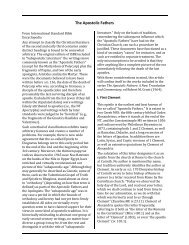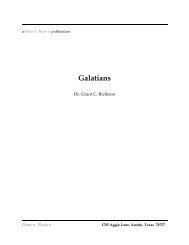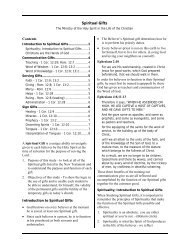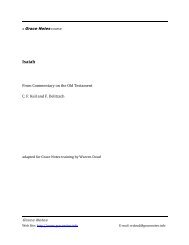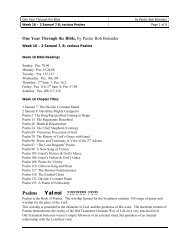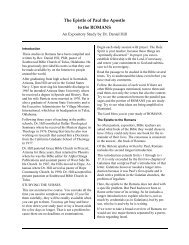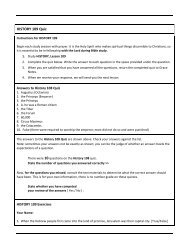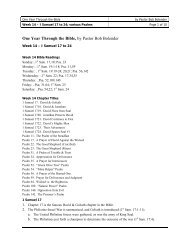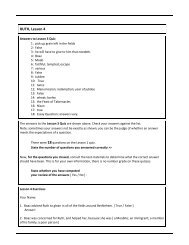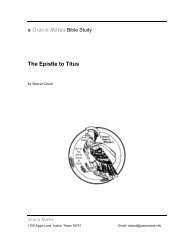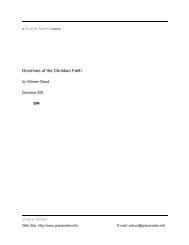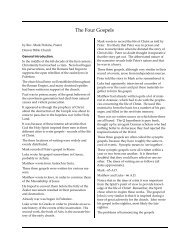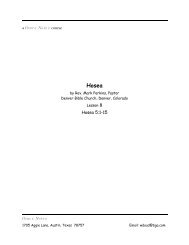Song of Solomon - Grace Notes
Song of Solomon - Grace Notes
Song of Solomon - Grace Notes
You also want an ePaper? Increase the reach of your titles
YUMPU automatically turns print PDFs into web optimized ePapers that Google loves.
SONG OF SOLOMON Page 13By C. F. Keil and F. Delitzscha <strong>Grace</strong> <strong>Notes</strong> studycogitationes longe plus absurditatis habent. Toinventory the maculatur <strong>of</strong> these absurdities isa repulsive undertaking, and, in the main, auseless labour, from which we absolveourselves.<strong>Song</strong> <strong>of</strong> <strong>Solomon</strong> 1<strong>Song</strong> 1:1. The title <strong>of</strong> the book at once denotesthat it is a connected whole, and is the work <strong>of</strong>one author.—Ch. 1:1. The <strong>Song</strong> <strong>of</strong> <strong>Song</strong>s,composed by <strong>Solomon</strong>. The genitival connection,“<strong>Song</strong> <strong>of</strong> <strong>Song</strong>s,” cannot here signify the <strong>Song</strong>consisting <strong>of</strong> a number <strong>of</strong> songs, any more thancalling the Bible “The Book <strong>of</strong> books” leads us tothink <strong>of</strong> the 24 + 27 canonical books <strong>of</strong> which itconsists. Nor can it mean “one <strong>of</strong> <strong>Solomon</strong>’ssongs;” the title, as it here stands, would thenbe the paraphrase <strong>of</strong> יר שִ ירֵ י שְׁ ׳ ,שִ chosen for thepurpose <strong>of</strong> avoiding the redoubled genitives;but “one <strong>of</strong> the songs” must rather have beenexpressed by יר מִ שִ ירֵ י .שִ It has already beenrightly explained in the Midrash: “the mostpraiseworthy, most excellent, most highlytreasuredamong the songs.” The connection issuperl. according to the sense (cf. η<strong>of</strong> Sophocles), and signifies that songwhich, as such, surpasses the songs one and all<strong>of</strong> them; as “servant <strong>of</strong> servants,” Gen. 9:25,denotes a servant who is such more than allservants together. The plur. <strong>of</strong> the second wordis for this superl. sense indispensable (vid.,Dietrich’s Abhand. zur hebr. Gramm. p. 12), butthe article is not necessary: it is regularlywanting where the complex idea takes the place<strong>of</strong> the predicate, Gen. 9:25, Ex. 29:37, or <strong>of</strong> theinner member <strong>of</strong> a genitival connection <strong>of</strong>words, Jer. 3:19; but it is also wanting in otherplaces, as Ezek. 16:7 and Eccles. 1:2; 12:8,where the indeterminate plur. denotes nottotality, but an unlimited number; here it wasnecessary, because a definite <strong>Song</strong>—that,namely, lying before us—must be designated asthe paragon <strong>of</strong> songs. The relative clause, “asherlishlōmō,” does not refer to the single word“<strong>Song</strong>s” (Gr. Venet. ῶ ῦ), as it would if theexpression were יר מֵ הַ שִ ׳ ,שִ but to the whole idea<strong>of</strong> “the <strong>Song</strong> <strong>of</strong> <strong>Song</strong>s.” A relative clause <strong>of</strong>similar formation and reference occurs at 1Kings 4:2: “These are the princes, asher lo,which belonged to him (<strong>Solomon</strong>).” They whodeny the <strong>Solomon</strong>ic authorship usually explain:The <strong>Song</strong> <strong>of</strong> <strong>Song</strong>s which concerns or refers to<strong>Solomon</strong>, and point in favour <strong>of</strong> thisinterpretation to LXX B. ὅ ἐσ Σ λ., which,however, is only a latent genit., for which LXX A.ῷ Σ λ. Lamed may indeed introduce thereference <strong>of</strong> a writing, as at Jer. 23:9; but if thewriting is more closely designated as a “<strong>Song</strong>,”“Psalm,” and the like, then Lamed with thename <strong>of</strong> a person foll. is always the Lamedauctoris; in this case the idea <strong>of</strong> reference to, ase.g., at Isa. 1:1, cf. 1 Kings 5:13, is unequivocallyexpressed by .על We shall find that thedramatized history which we have here, or aswe might also say, the fable <strong>of</strong> the melodramaand its dress, altogether correspond with thetraits <strong>of</strong> character, the favourite turns, thesphere <strong>of</strong> vision, and the otherwise well-knownstyle <strong>of</strong> authorship peculiar to <strong>Solomon</strong>. Wemay even suppose that the superscription waswritten by the author, and thus by <strong>Solomon</strong>himself. For in the superscription <strong>of</strong> theProverbs he is surnamed “son <strong>of</strong> David, king <strong>of</strong>Israel,” and similarly in Ecclesiastes. But he whoentitles him merely “<strong>Solomon</strong>” is most probablyhimself. On the other hand, that the title is bythe author himself, is not favoured by the factthat instead <strong>of</strong> the ,ש everywhere else used inthe book, the fuller form asher is employed.There is the same reason for this as for the factthat Jeremiah in his prophecies always usesש asher, but in the Lamentations interchangeswith asher. This original demonstrative ש isold-Canaanitish, as the Phoenician ,אש arrestedhalf-way toward the form asher, shows. In theBook <strong>of</strong> Kings it appears as a North Palest.provincialism, to the prose <strong>of</strong> the pre-exilianliterature it is otherwise foreign; but the preexilianshir and kinah (cf. also Job 19:29) makeuse <strong>of</strong> it as an ornament. In the post-exilianliterature it occurs in poetry (Ps. 122:3, etc.)and in prose (1 Chron. 5:20; 27:27); inEcclesiastes it is already a component part <strong>of</strong>



